|
|
|
Sort Order |
|
|
|
Items / Page
|
|
|
|
|
|
|
| Srl | Item |
| 1 |
ID:
142038
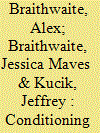

|
|
|
|
|
| Summary/Abstract |
Violent domestic conflicts spread between countries via spillover effects and the desire to emulate events abroad. Herein, we extend this emulation logic to the potential for the contagion of nonviolent conflicts. The spread of predominantly nonviolent pro-democracy mobilizations across the globe in the mid-to-late 1980s, the wave of protests in former Soviet states during the Color revolutions in the 2000s, and the eruption of nonviolent movements across the Middle East and North Africa during the Arab Spring in the early 2010s each suggest that the observation of collective action abroad encourages a desire to emulate among potential challengers to domestic autocrats. However, the need to emulate varies. Potential challengers with a recent history of protest at home are less dependent (than are those without similar experience) upon foreign exemplars to mobilize the participants and generate the resources required to make emulation practicable. By contrast, where the domestic experience of protest is absent, opposition movements are more reliant upon emulation of foreign exemplars. We test the implications of this logic using a series of multivariate logistic regression analyses. Our tests employ data on nonviolent civil resistance mobilizations that occurred across the global population of autocratic states between 1946 and 2006. These tests, along with post-estimation analysis, provide evidence consistent with our conditional logic of emulation.
|
|
|
|
|
|
|
|
|
|
|
|
|
|
|
|
| 2 |
ID:
174723


|
|
|
|
|
| Summary/Abstract |
A growing literature identifies both situations where aid promotes peace and those where aid encourages violence. Specifically, research shows lower probability of conflict onset in democratizing states receiving high levels of democracy assistance. However, theorizing has overlooked important actors who have agency in spending such aid: civil society organizations (CSOs). We posit that the status of civil society within recipient states conditions the effect of democracy aid inflows on conflict probability. Using an instrumental variables approach to account for endogeneity between aid allocation and conflict propensity, we find that democracy aid is destabilizing when directed to environments where CSOs are weak and poorly connected to the regime and thus are less willing and able to seek change through peaceful means. When civil society is stronger and more institutionalized, however, larger democracy aid flows pose less threat.
|
|
|
|
|
|
|
|
|
|
|
|
|
|
|
|
| 3 |
ID:
160475
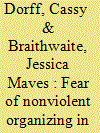

|
|
|
|
|
| Summary/Abstract |
What drives perceptions of fear regarding nonviolent mobilization? We investigate whether this fear is more acute in certain segments of society, or whether such concerns are randomly distributed across the population. We anticipate that civilians living in proximity to armed resistance groups are especially afraid of being targeted if they organize nonviolently against insecurity in their community. Using original survey data from Mexico in early 2014, we examine civilian perceptions of risk associated with nonviolent action. Quantitative analyses provide support for our expectation that civilians living in proximity to armed vigilante groups are more fearful of participating in nonviolent action. This suggests that organizers of civil resistance in Mexico (and similar conflict environments) would do well to consider the challenges posed by civilian vigilantism when seeking to mobilize civilians and selecting specific nonviolent strategies for high-risk constituencies.
|
|
|
|
|
|
|
|
|
|
|
|
|
|
|
|
| 4 |
ID:
193114


|
|
|
|
|
| Summary/Abstract |
Ceasefires are a critical tool for those engaged in conflict management during civil wars, yet little scholarship exists that systematically assesses the durability of these arrangements. We argue that ceasefire failure is driven by variations in the composition of organized dissent including and beyond the context of the civil war. In particular, ceasefires should break down faster given increasingly complicated environments of broader anti-government dissent, where resistance dynamics alter the perceived or actual balance of power between rebels and the state. Using original data on organizations participating in violent and nonviolent dissent across African states from 1990-2015, and new data on civil war ceasefires, we find that ceasefire breakdown is precipitated by complex resistance environments that put the government in a precarious position. Increasing numbers of mobilized organizations, higher ideological fractionalization among those groups, more dense and increasingly decentralized dissident networks all expedite the failure of ceasefires in civil wars.
|
|
|
|
|
|
|
|
|
|
|
|
|
|
|
|
| 5 |
ID:
175737
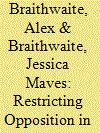

|
|
|
|
|
| Summary/Abstract |
We offer a novel argument to explain how the use of terrorist violence is affected by the restrictions that governments place on opposition participation in elections. Opposition actors often decide whether and how to participate in elections. Governments influence these decisions by controlling who can contest elections and, by doing so, they influence the access to public support that opponents stand to gain from participating or fighting. “Unrestricted” elections, without limits on who can participate in opposition to the government, represent an opportunity for moderation in politics. This moderation threatens the raison d’être of violent extremists. Accordingly, extremists are likely to look to use violence to spoil unrestricted elections. “Restricted” elections, where some opponents are excluded from participating, undermine public support to the opposition as a whole, thereby reducing the likelihood that they are able to resort to terrorism. Importantly, these effects are anticipated to be most prevalent in non-democracies, where norms of moderation in politics are yet to be fully developed. A series of negative binomial regression models provide support for these dual logics.
|
|
|
|
|
|
|
|
|
|
|
|
|
|
|
|
| 6 |
ID:
188996
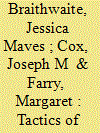

|
|
|
|
|
| Summary/Abstract |
Scholars have found that nonviolent resistance is more effective than violence at promoting post-campaign democratization. We explore whether this relationship extends to judicial systems, specifically. Courts have been shown to be important for promoting and protecting economic development and political rights, yet they have been largely ignored in quantitative studies of post-conflict democratization. We posit that leaders who hold power after domestic unrest will be more inclined to use independent courts as a mechanism to prevent future campaigns–but they do so primarily when fearing a significant mobilization threat and when expecting legal action to be an acceptable channel for dispute resolution by dissidents. As such, we anticipate that levels of judicial independence are higher following nonviolent campaigns as compared to violent conflicts. Using quantitative data from violent and nonviolent campaigns globally, we find that judicial independence is indeed higher in the aftermath of nonviolent, as compared to violent, resistance campaigns. Furthermore, a campaign’s outcome does not matter; post-conflict judicial independence appears to be associated with tactics, not dissident success.
|
|
|
|
|
|
|
|
|
|
|
|
|
|
|
|
| 7 |
ID:
171846
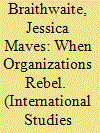

|
|
|
|
|
| Summary/Abstract |
Scholars have spent decades investigating various sources of rebellion, from societal and institutional explanations to individual motivations to take up arms against one's government. One element of the civil war process that has gone largely unstudied from a cross-national perspective is the role preexisting organizations in society play in the formation of rebel groups, principally due to a lack of comparable data on the origins of these armed actors across conflicts. In an effort to fill this gap, we present the Foundations of Rebel Group Emergence (FORGE) dataset, which offers information on the “parent” organizations and the founding processes that gave rise to rebel groups active between 1946 and 2011 in intrastate conflicts included in the Uppsala Conflict Data Program's Armed Conflict Database. The new information on rebel foundations introduced in this research note should help scholars to reconsider and newly explore a variety of conditions before, during, and after civil wars including rebel-civilian interactions, structures of rebel organizations, bargaining processes with the government, participation in postwar governance, and more.
|
|
|
|
|
|
|
|
|
|
|
|
|
|
|
|
|
|
|
|
|